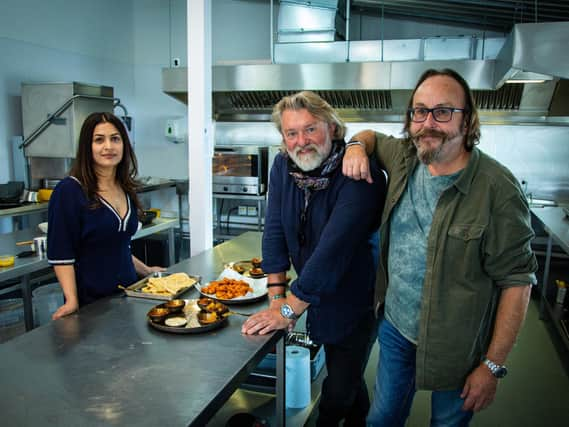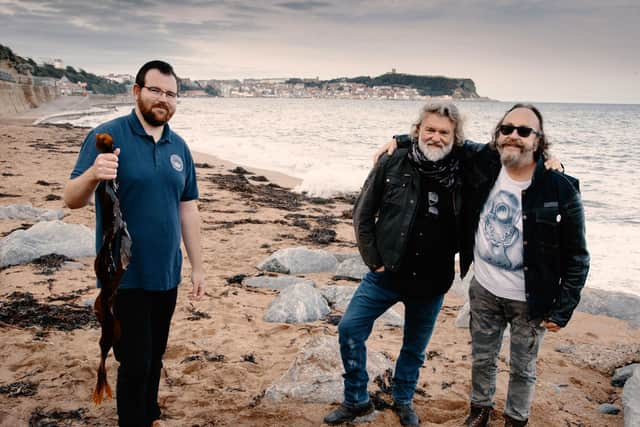The Hairy Bikers Go North BBC series heads to Scarborough, Whitby, Robin Hood's Bay, Driffield and Malton as pair show love for Yorkshire


Television cook Si King is enjoying the fruits of a food lover’s promised land in Italy while his old pal Dave Myers has spent the morning foraging in Romania on the day of our interview.
But it’s the North of England’s fine fare, and its even finer folk, that they want to talk about.
Advertisement
Hide AdAdvertisement
Hide AdThe second episode of their latest BBC series, The Hairy Bikers Go North, aired on Thursday, when the unmistakable leather-clad duo head to the Yorkshire Coast – the first of three episodes dedicated to the region.


“I’ve just been out mushrooming this morning, so it’s mushroom soup for tea – lots of porcini. Great,” says Myers, down the line from Sighetu Marmației, where his mother-in-law lives.
So the food is good there?
“Yes – but not as good as Yorkshire,” he says, mock-scripted.
Given the diverse range of artisan food producers the pair visited while filming the show last year, it’s clear they really do love the region’s offerings.
Advertisement
Hide AdAdvertisement
Hide AdAs King says, though, the series is as much about the incredible tales behind the food and not just what’s on their plates.
“You sometimes overlook exactly what’s under your nose,” he says, albeit over the phone from Puglia, where his family is celebrating the birth of his eldest son’s baby girl (King’s first time as a grandfather).
“Dave and I are the conduit of other people’s stories. We just rock up and want to hear their stories and some of the stories that we heard were just fantastic. I’m pleased to see that, despite all of the political rhetoric, we’ve got a multi-cultural society that is alive and well and still has its humanity to it, which we should, as a whole country, be rightly proud of rather than not.”
The Yorkshire Coast leg tonight starts in Scarborough, where the bikers visit the SeaGrown offshore seaweed operation.
Advertisement
Hide AdAdvertisement
Hide AdThey then ride to Aike, Driffield, to see a family’s vineyard and winery, Laurel Vines, run by Ian and Ann Sargent. Afterwards it’s to Malton where they discover the art of making the perfect macaron with Florian Poirot, a Frenchman adopted by Yorkshire. The pair also visit Whitby and meet Barry Brown, of Fortune’s Kippers.
In the fourth episode, the bikers ride across North Yorkshire and begin by meeting a former hairdresser who looks after the rare mangalitza pig breed, which almost died out in the 1990s, and elsewhere learn about beekeeping and apple orchards for cider.
Yorkshire again features in the fifth episode, with a visit to Leeds’s Kirkgate market before, among other memorable moments, they stop to see Monalisa Fathima, of Harrogate’s Saffron Tree, which makes quality Indian ready meals; the people behind ethical and sustainable KC Caviar; and Razan Alsous, alongside husband Raghid, who settled in Sowerby Bridge and founded Yorkshire Dama Cheese after fleeing war-torn Syria.
“That had us in tears,” says King. “These were a very successful Syrian family that had to flee Syria because suddenly there was the possibility that that family could have been wiped out.
Advertisement
Hide AdAdvertisement
Hide Ad“I mean, that’s remarkable. What a complete change in life and culture that they’ve had to embrace and it was great that the Yorkshire community did so (too), embrace them, and they were embraced by the UK.”
Myers adds: “They’ve got a factory making the most wonderful product and employing quite a large number of people – really contributing – but I think they would say they’re proudly Yorkshire folk now and I think Yorkshire’s proud of them too.
“But the story does make you catch your breath,” he says.
“Si and I like to be able to listen as well as talk on. We’re not known for being quiet but listening to their story is quite special.”
In last week’s episode the pair were in Myers’ native Lancashire and during the eight-episode series also visit Cumbria, the Peak District, Northumberland and King’s home region of the Tyne and Wear.
Advertisement
Hide AdAdvertisement
Hide AdTheir previous television adventures have taken them around the world, exploring the landscapes, cultures and food of the Mediterranean, Asia and the USA.
But they are keen to stress that the limitations of the pandemic had nothing to do with the choice to shoot a series domestically this time. Although they were developing the idea of doing something about Spain, they realised it had been a good 10 years since they had made a televised road trip in Britain, so wanted to do something a bit more personal and close to home.
“In this Thursday’s show we cook in Robin Hood’s Bay. I think it’s a langoustine dish and it’s the most amazing house that’s nestled into the rocks,” says Myers. “By God what a place to live and what a place to cook.”
He adds: “I think we’ve found some stuff that people would be surprised at. Interesting stuff, not the same old, same old.”
Advertisement
Hide AdAdvertisement
Hide AdThe show also promotes the North’s contribution to the British food scene, one which in the past was derided for its lack of sophistication. In recent years, it has clawed back a great deal of respect due to its culinary force.
King says: “There is a level of sophistication in terms of producing food (in Britain). There aren’t many countries where you can eat your way around the world, can eat your way around the world very well and authentically. In most if not all provincial cities in the country, we have a myriad of cuisines that we can choose from. And that’s because we live in a multi-cultural country. And that’s important to remember.
“In terms of breaking that complete and utter nonsense of a myth that the UK isn’t sophisticated around its food, the North’s had a huge part to play in that. All you need to do is look at the programme and the programmes by other chefs that continue to be made about the cuisines of the whole of the UK. The North’s had an incredibly important part to play (in) bringing the identity of British foods, which is fundamentally eclectic, to the eyes of the world.”
Myers adds: “I think Britain has been working quite hard on that for the past 20 years. The food scene started to change in the 1990s, I think, not just with people like Keith Floyd cooking on the telly –you’ve seen the amount of people who go to food festivals now.”
Advertisement
Hide AdAdvertisement
Hide AdIn the early 20th century Britain was “doing all right” with its food, he says, but that changed with the World Wars and rationing.
“In the 1960s and 70s when I was growing up, we kind of embraced the worst processed food you’d ever seen in your life. Bread you could use, when I was a kid, as a rubber when you were drawing with your pencils. It wasn’t good.
“But now I think we’re in a very good place – and I hope we stay like that,” he says. “The produce is there for us to buy and we don’t have to look too far to get it.”
The Hairy Bikers Go North is airing weekly at 8pm on BBC Two.
Comment Guidelines
National World encourages reader discussion on our stories. User feedback, insights and back-and-forth exchanges add a rich layer of context to reporting. Please review our Community Guidelines before commenting.